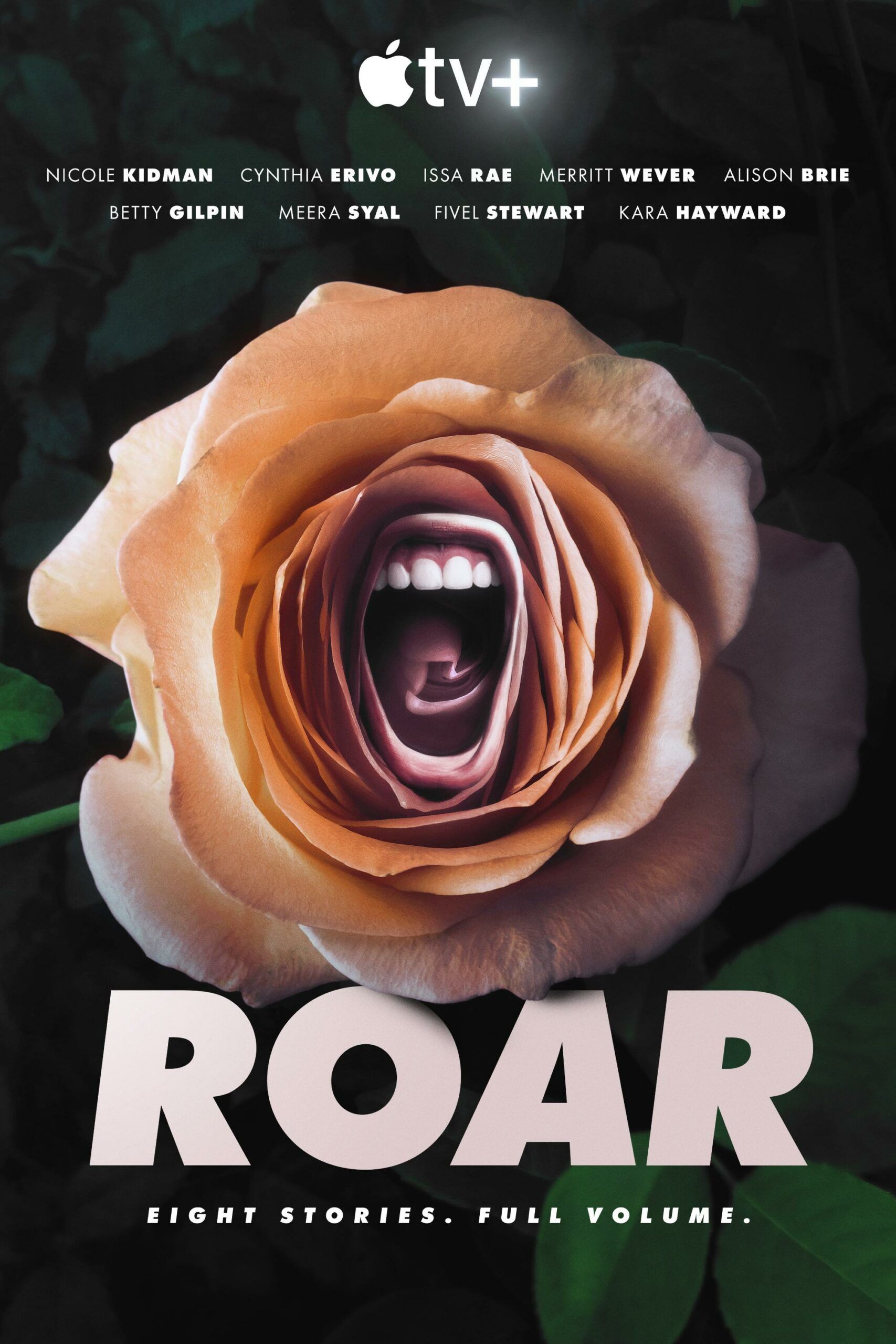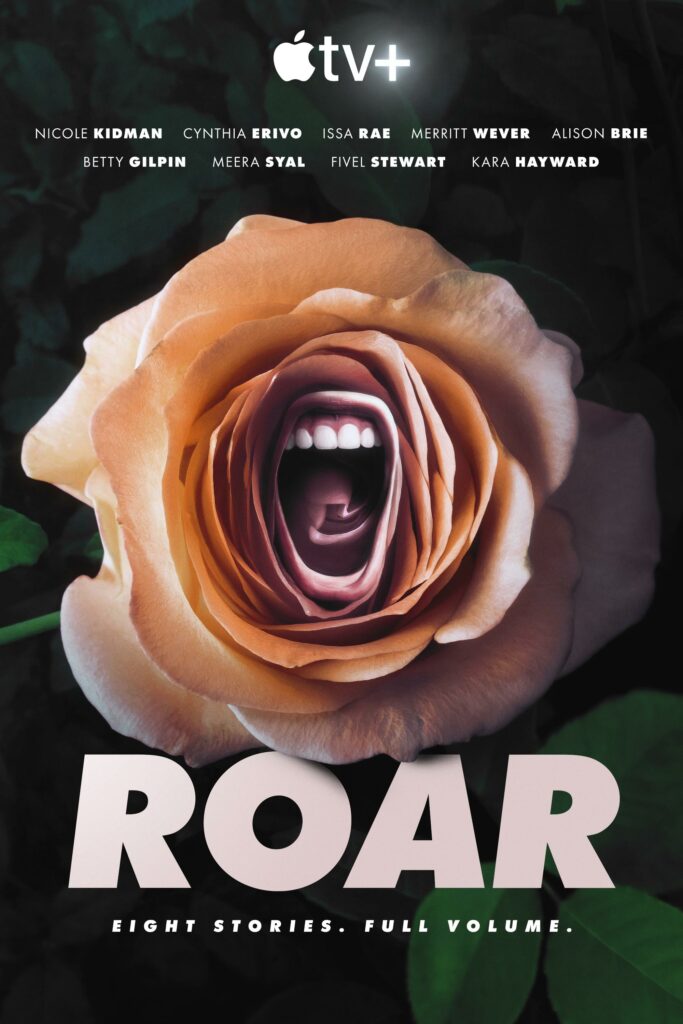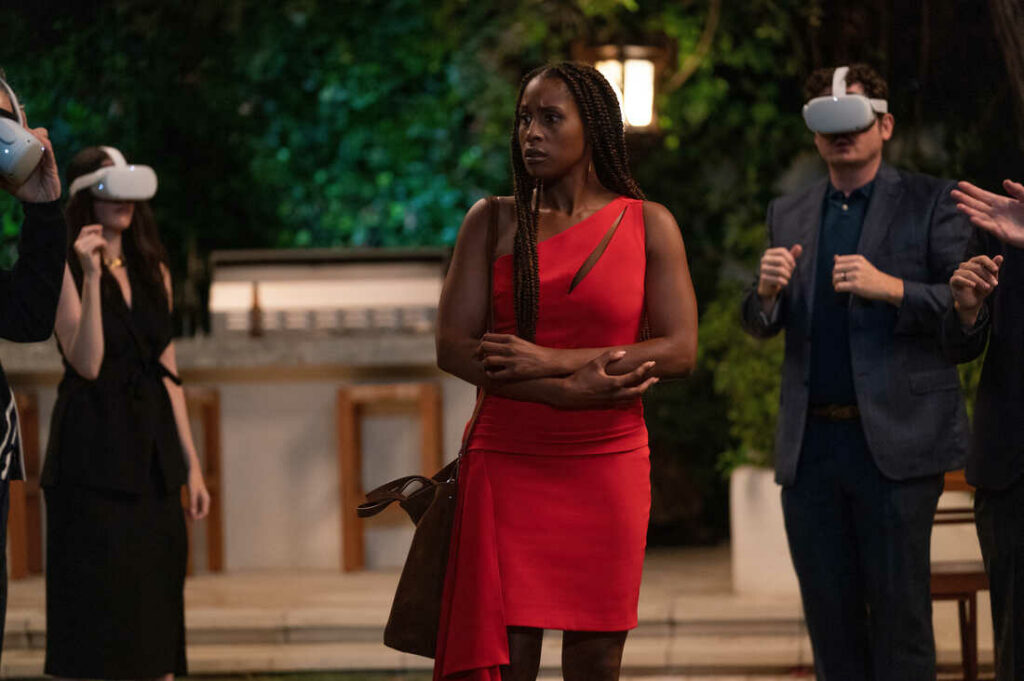
“Roar”–Hear My Voice

Roar is a new Apple mini-series, a show-and-tell of eight feminist vignettes based upon Cecelia Ahern’s 2018 short story anthology. Highlighting the unexpected onslaught of devastating events from family, friends, corporations, and community, Roar attempts to address what women are trying to express about themselves. The opening graphic–a feminist scream of a vulva-suggesting mouth stretching wide inside of a rose–perhaps says it best. Hear my voice!
Each of the self-contained episodes begins with the title “The Woman Who…” with a completed title obvious in what is about to happen. Roar promises portraits with original, provocative perspectives on motherhood, marriage, friendship, career-building, and parent-daughter ties. Hooking the viewer with an A-list of actors (Issa Rae, Nicole Kidman, Cynthia Erivo, Alison Brie among others), the bar is set high for women’s empowerment. Magical realism, ghosts and ephemera, occasionally on the cusp of sci-fi, Roar even echoes “Black Mirror” and “Twilight Zone.”

Anthologies can be a mixed bag, with uneven narratives and performances. While all the episodes feature, almost without exception, first-rate acting, only three stand out as worthy to watch…but with flaws that are not minor either.
****Spoiler Alert***
These three are worthy: Episode One: “The Woman Who Disappeared,” starring Issa Rae as Wanda, a newly successful novelist who, like many authors, dreams of having her book adapted to the screen by Hollywood. Her memoir is about growing up in Los Angeles: as a Black girl in a world not welcoming or ready for her. In the executive producers’ meeting, she increasingly withers under the white male gaze until she literally disappears.
Episode Four: “The Woman Who Found Bite Marks on Her Skin” is a Jordan Peele-inspired horror nightmare starring Cynthia Erivo as a powerful executive struggling to balance motherhood with career. The hostile work environment, social pressures on fulfilling the idealization of motherhood, and Black maternal mortality all literally eat her from within.
Episode Eight: “The Woman Who Loved Horses” is a modern western, starring Fivel Stewart as a young, ethnically Asian woman intent upon avenging her father’s death. The father-daughter relationship, the greed and thirst to eliminate competition, and the awakening of a neighbor girl’s independence drive this riff on young girls and their equine love.
This series has a powerful message of empowerment through self-actualization and determination, but this viewer felt cheated. Of course, the acting– with an astounding supporting cast (for example, Alfred Molina and Hugh Dancy) makes for riveting drama. However, each story–including the three recommended here–seem short-circuited by a narrative not substantive enough to support the weight of what is being revealed. How can a thirty-minute drama seem sluggish? Because none of the episodes give sufficient backstory to flesh out three-dimensional characters, not paper dolls of females.
What went terribly wrong in Roar? Each tale should have been packed with the character’s intention and motivation to endure the unendurable. Why does Wanda feel she has no choice but to comply with the white corporate executives? Does success mean sacrificing what she believes in because she doesn’t –or can’t –believe in herself? Why does Cynthia Erivo’s character feel trapped by her work situation and guilt for her choices? And why does Fivel Stewart’s character feel letting go of her father damages their legacy?
Roar has a dream team and screenwriters’ and author’s pedigree. Roar’s howl should have been consistently inspiring, shouting and calling out obstructionist social structures attempting to undermine human potential and dreams. Much more could have been done in thirty minutes.
All eight episodes intrigue at first, but then leave you with unsatisfactory and forgettable endings. One could easily have loved Roar — yet this viewer’s feelings fade. I was not rewarded for anticipation of incisive visions of women’s truths and defeats, triumphs and compromises. The interplay of light and dark is never sharply focused but amorphous, not raising questions about what is the next step or, is a next step even possible.
Much of the heart of Roar is broken. How are these characters worth caring about? Individual episodes about women and what we go through as mothers, daughters, sisters, friends and partners should be unique and compelling. Interestingly, the three recommended episodes all feature women of color. Their worlds are more troublesome, and therefore, the drama is more sinister and heart-pounding due to a world in which their voices are even more silenced than white women’s.
So disappointing on so many levels! Roar overall has the quality and polish of a class of unfinished student film projects. It’s all lost in the writing, which just skims the surface.
Availability: Apple+

lenore gay
This is a smart piece on your part with good work. We see there are various levels of work. Overall sounds elementary and disappointing.
Best wishes,
Lenore